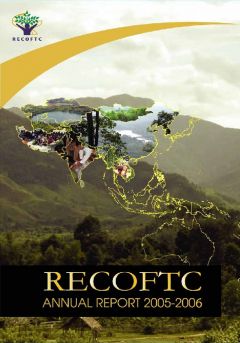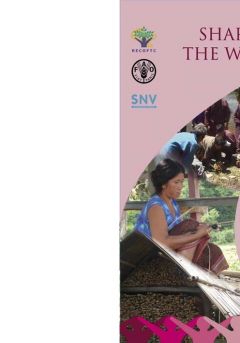Location
RECOFTC
RECOFTC is derived from an abbreviated form of the organization's legal name, Regional Community Forestry Training Center for Asia and the Pacific. Formerly the organization was known as RECOFTC – The Center for People and Forests.
RECOFTC – The Center for People and Forests is an international not-for-profit organization that focuses on capacity building for community forestry in the Asia Pacific region. It advocates for the increased involvement of local communities living in and around forests - some 450 million people in Asia-Pacific - in the equitable and ecologically sustainable management of forest landscapes.
The Regional Community Forestry Training Center for Asia and the Pacific (RECOFTC) opened in Bangkok, Thailand, in March 1987 with support from the United Nations Food and Agriculture Organization, the Government of Switzerland (through the Asian Development Bank), and Thailand's Kasetsart University.
Community forestry is widely acknowledged as a powerful solution for many of the challenges facing local people and the wider society, especially in improving rural livelihoods, enhancing community governance and empowerment, transforming forest-related conflict, protecting and enhancing the environment, and helping to fight climate change. As a capacity-building organisation, RECOFTC improves the ability of people and organisations to conduct community forestry effectively and sustainably.
RECOFTC works toward its mission through four thematic areas:
- expanding community forestry
- people, forests and climate change
- transforming forest conflict
- securing local livelihoods.
Members:
Resources
Displaying 451 - 455 of 485Land, Forest and People: Facing the Challenges in South-East Asia - Rights and Resources Initiative
This is a regional overview of the main legal and regulatory questions concerning ownership or access to and management of land-based natural resources. Using the Listening Learning and Sharing (LLS) method, RECOFTC, the Southeast Asia office of the World Agroforestry Centre (ICRAF) and other RRI partners from the Asia region produced a regional overview of the main legal and regulatory questions concerning ownership or access to and management of land-based natural resources.
RECOFTC Annual Report 2005-2006
"Twenty years ago when RECOFTC was born, community forestry was just emerging onto the global scene as a viable policy option to restore degraded forests and to provide livelihood support for local communities living adjacent to forests. These two objectives remain today, but to them has been added a plethora of other objectives including poverty alleviation, environmental services, equity and governance to name just a few. In short, community forestry, along with other forms of forestry, has become more complex."
Summary
Sharing the Wealth: Policy and Legal Frameworks to Support Equitable Sharing of Costs and Benefits from Community Forestry
Community forestry has great potential to improve the welfare of the estimated 450 million impoverished people living in and around forests in Asia. But the extent to which this potential is realized depends strongly upon whether communities are able to secure the benefits that community managed forests generate, and whether these actually reach the poorest at the community level. The real benefits obtained in return for the time and energy expended by communities in forest management helps to gain their long-term commitment to sustainable forest management.
Sharing the Wealth: Policy and Legal Frameworks to Support Equitable Sharing of Costs and Benefits from Community Forestry
Community forestry has great potential to improve the welfare of the estimated 450 million impoverished people living in and around forests in Asia. But the extent to which this potential is realized depends strongly upon whether communities are able to secure the benefits that community managed forests generate, and whether these actually reach the poorest at the community level. The real benefits obtained in return for the time and energy expended by communities in forest management helps to gain their long-term commitment to sustainable forest management.
Sharing the Wealth: Policy and Legal Frameworks to Support Equitable Sharing of Costs and Benefits from Community Forestry
Community forestry has great potential to improve the welfare of the estimated 450 million impoverished people living in and around forests in Asia. But the extent to which this potential is realized depends strongly upon whether communities are able to secure the benefits that community managed forests generate, and whether these actually reach the poorest at the community level. The real benefits obtained in return for the time and energy expended by communities in forest management helps to gain their long-term commitment to sustainable forest management.




